There are many popular misconceptions about the Vegan diet. Unfortunately, these myths are not only common among non-vegans, but there are some that even plant-based eaters share!
Let’s go through the 16 biggest Vegan myths and debunk them!
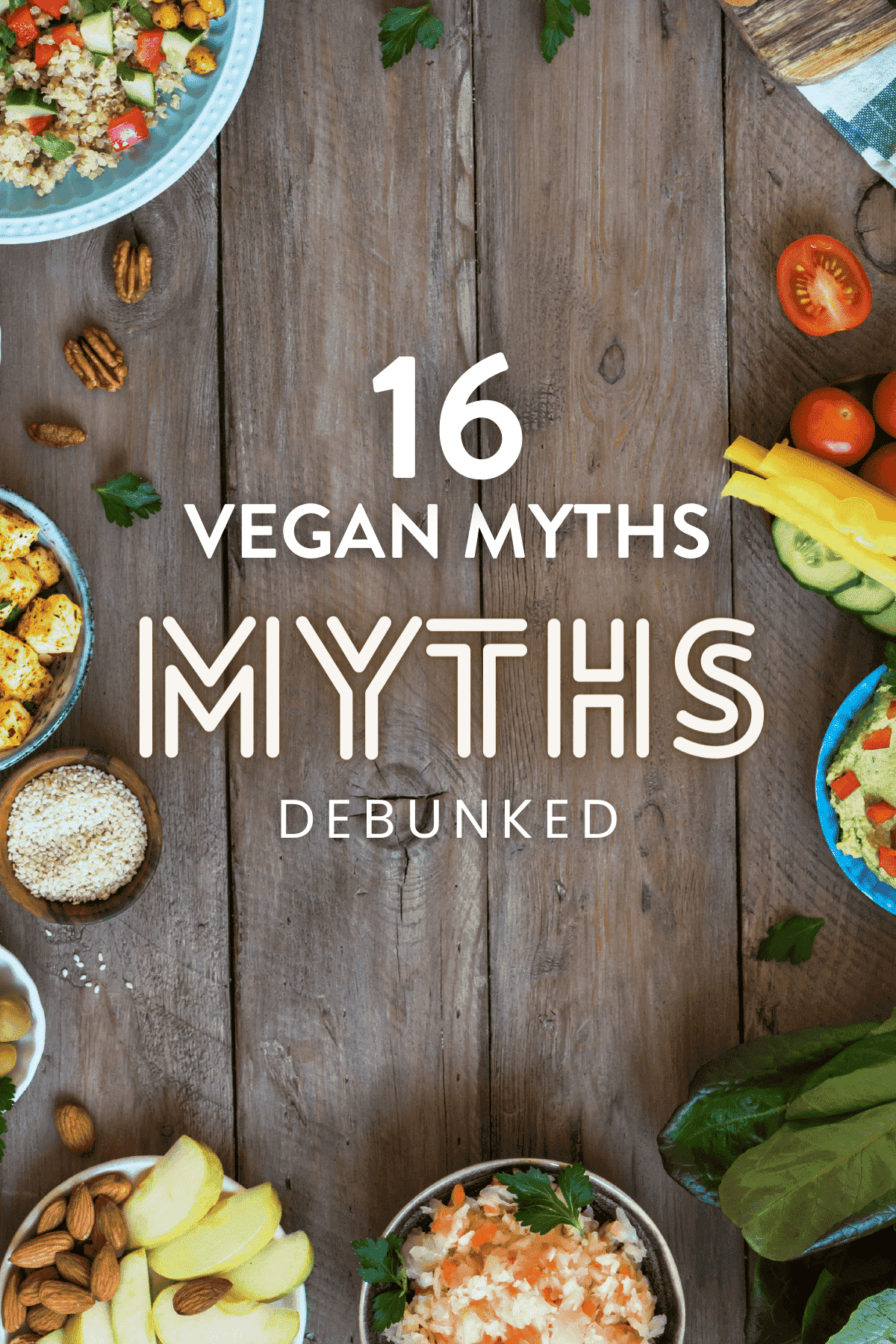
1. Veganism Is Not Healthy
Most people choose to follow a vegan diet, not for health reasons but rather for ethical or environmental reasons.
So, as such, it doesn’t attempt to make people healthier. But it still does.
Where this myth comes from
The Vegan diet has profound roots, even though veganism was only formalized in the middle of the 20th century.
While it started very much under any radar, veganism has taken off in the last 20 years.
Because it’s still quite a recent thing, there weren’t (initially) many studies evaluating its potential risks. Or benefits.
As a result, two factors came to play:
- Ignorance: People thought about the vegan diet as the removal of many ingredients from their diet. How can a diet with fewer essential food items be healthy? That was ignoring that vegans tend to eat much more varied (source) than omnivore dieters.
- Lobbying: The food industry took a long time to embrace the vegan diet fully, and as often, it fought veganism with misinformation. Messages like Milk is required for strong bones or Meat is needed for muscles have contributed to the shared idea that one can’t live without consuming animal-based products.
Why is it a myth? Because vegans can be perfectly healthy!
Sources
- Vegetarian, vegan diets and multiple health outcomes: A systematic review with meta-analysis of observational studies
- Nutritional Update for Physicians: Plant-Based Diets
2. Eating Vegan Is More Harmful To The Environment Than Meat
There’s a common argument that is opposed to veganism. “But [insert any vegetable here, like avocado] is more harmful to the environment than my steak!
This is, in the vast majority of cases, completely wrong. It’s, in fact, most of the time taking the most terrible plant-based food compared to the most virtuous animal product in a completely biased comparison.
Let’s have a look at the two most commonly criticized plant-based ingredients.
Why is it a myth? Because plant-based ingredients are almost always much better for the environment than animal-based equivalents.
The Case Of Avocados
Avocados sometimes have a non-negligible impact on the environment.
Their main issue is the quantity of water needed to grow them. This is not that much of an issue in relatively rainy countries like New Zealand, but it is much more problematic in areas affected by droughts, like Mexico or Southern California, where 90% of the US production comes from.
It takes 850 liters (224 gallons) to grow one kilo of avocados. Compared to 189 liters (50 gallons) for one kilo of Cauliflower, it’s a lot. And for places where water is scarce, it sounds huge.
However, it’s all about comparison.
- One kilo of beef consumes an astonishing 15,415 liters of water (4,072 gallons).
- One kilo of butter consumes no less than 5,553 liters of water (1,466 gallons).
- One kilo of cheese takes an average of 3,178 liters of water (840 gallons).
Cheese uses 3.7x more water than avocados, butter 6.5x more, and beef 18 times more!
Sources
- Water Management Practices in California ‘Hass’ Avocado
- Water Footprint (Mekonnen, Hoekstra 2011)
- Global Food Report
The Case Of Almonds
Almonds receive a similar bad press, driven mostly by a dairy industry trying to fight a fast-growing market.
According to the story, almonds are extremely bad for the environment, so much worse than any other food.
The reality is that, yes, they are quite bad. But, again, it depends on where they are cultivated. A drought-affected region would be harmed by the almond farming industry much more.
But still, saying that almonds are worse than other non-vegan equivalent food items is simply a myth.
To grow one kilo of almonds takes as much as 4,632 liters of water (1,223 gallons). This is considerable.
Almonds are quite popular in milk form. One liter of Almond Milk takes 371 liters (98 gallons) of water to produce (it takes significantly less than 1kg of almonds to make 1 liter of milk).
It is still considerably less than cow’s Milk which clocks at 628 liters (165 gallons) of water per liter.
So like for like, Almond Milk consumes half the water that cow milk needs.
Sources
- Reducing food’s environmental impacts through producers and consumers
- Water Footprint (Mekonnen, Hoekstra 2011)
- Global Food Report
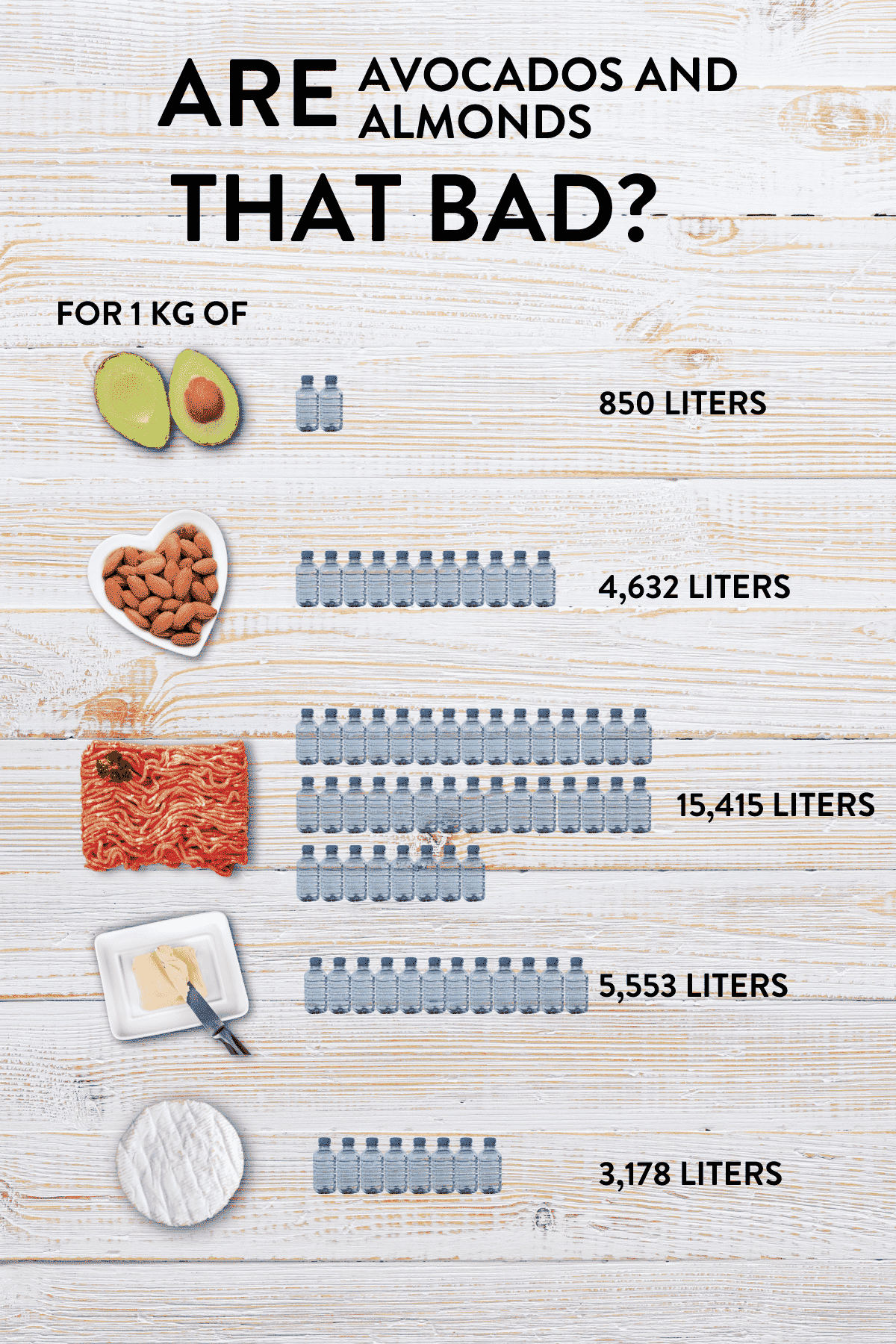
3. By The Way, Avocados Aren’t Vegan
This myth recently made the round on social media: Avocados (and almonds) aren’t vegan because they require bee colonies to be mechanically moved around crops for pollination.
So, this weird argument is that because bees are used at some point, avocados aren’t vegan.
While this certainly made everyone laugh at the expense of vegans, it’s very misleading.
Veganism is not about never using or harming animals. It’s about reducing the exploitation and harm of animals as much as practically possible.
If bee pollination were off-limits, then no crops at all would be vegan-friendly.
The argument isn’t actually the pollination that would make avocados not vegan, but rather the fact that hives are moved on the back of trucks.
Does the fact they are moved mechanically make it an exploitation of the bees? Since they are (supposedly) delivering a useful service while getting something in return (nectar for their hives), it sounds much more like a form of mutualism or symbiosis.
Unlike honey production, bees aren’t used for their products in avocado or almond crops.
Why is it a myth? Because bees aren’t exploited.
Sources: Avocados aren’t vegan (VeganLifeMag)
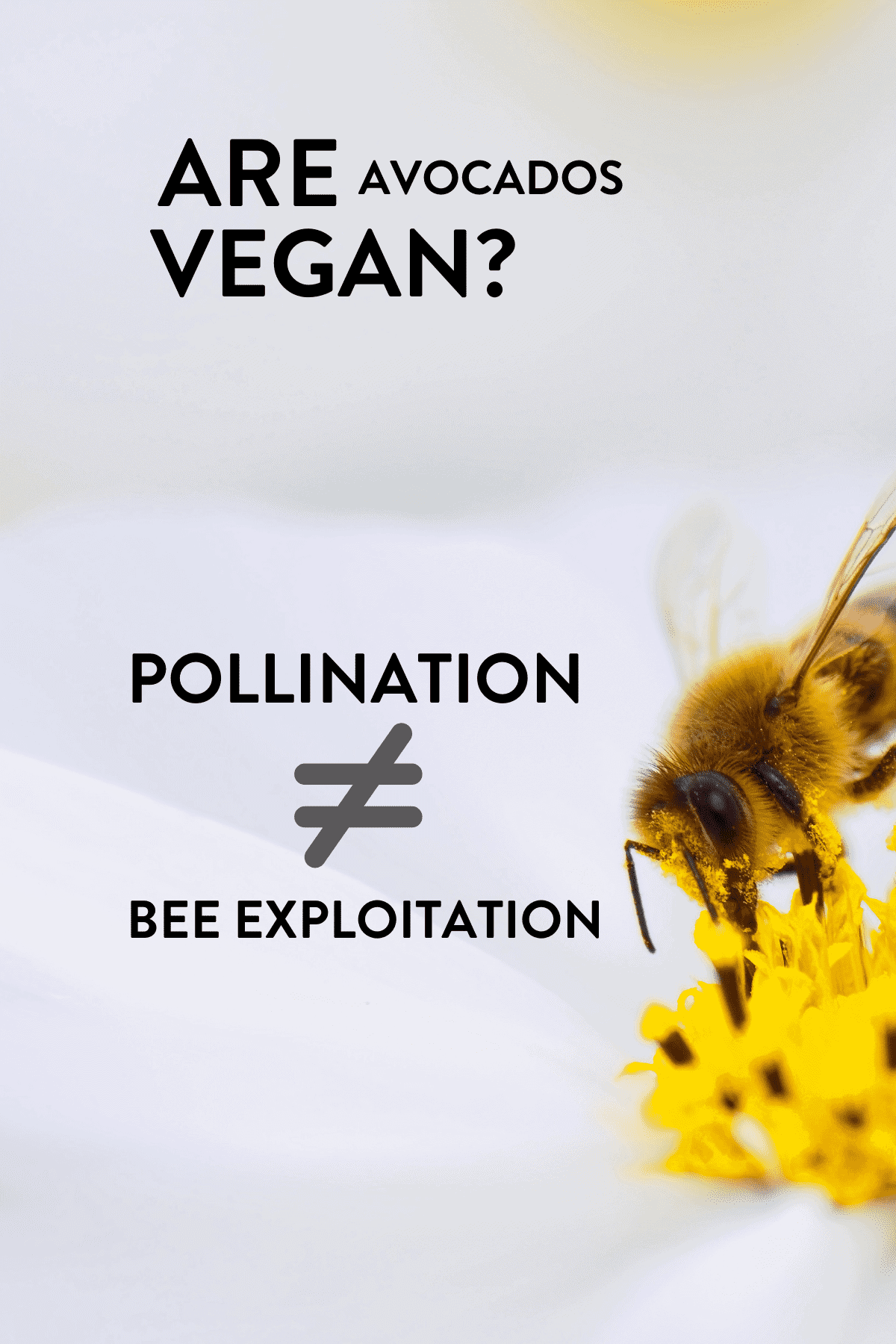
4. Vegans Don’t Get Enough Proteins
There’s a common misconception that only meat can bring you all the protein you need.
Most people actually believe that you can only get the nine essential amino acids from animal meats.
The reality is that there are many vegan protein sources, including several complete protein sources – foods that include all essential amino acids such as:
- Quinoa
- Tofu
- Hummus
- Nutritional Yeast
- and many more
As a result, vegans can easily get the same protein profile as non-vegans.
Now, let’s talk quantity because the myth is also about not getting enough of it.
One hundred grams of beef contains 26 grams of protein, while chicken meat is 27 grams. Compare that with:
- Seitan: Up to 72g per 100g
- Hemp Seeds: 31g per 100g
- Pumpkin Seeds: 30g per 100g
- Peanut Butter: 25g per 100g
- Almonds: 20g per 100g
So there are many foods you can combine to reach the very same level of high-quality plant-based protein as meat.
Why is it a myth? Because there are many vegan sources of proteins.
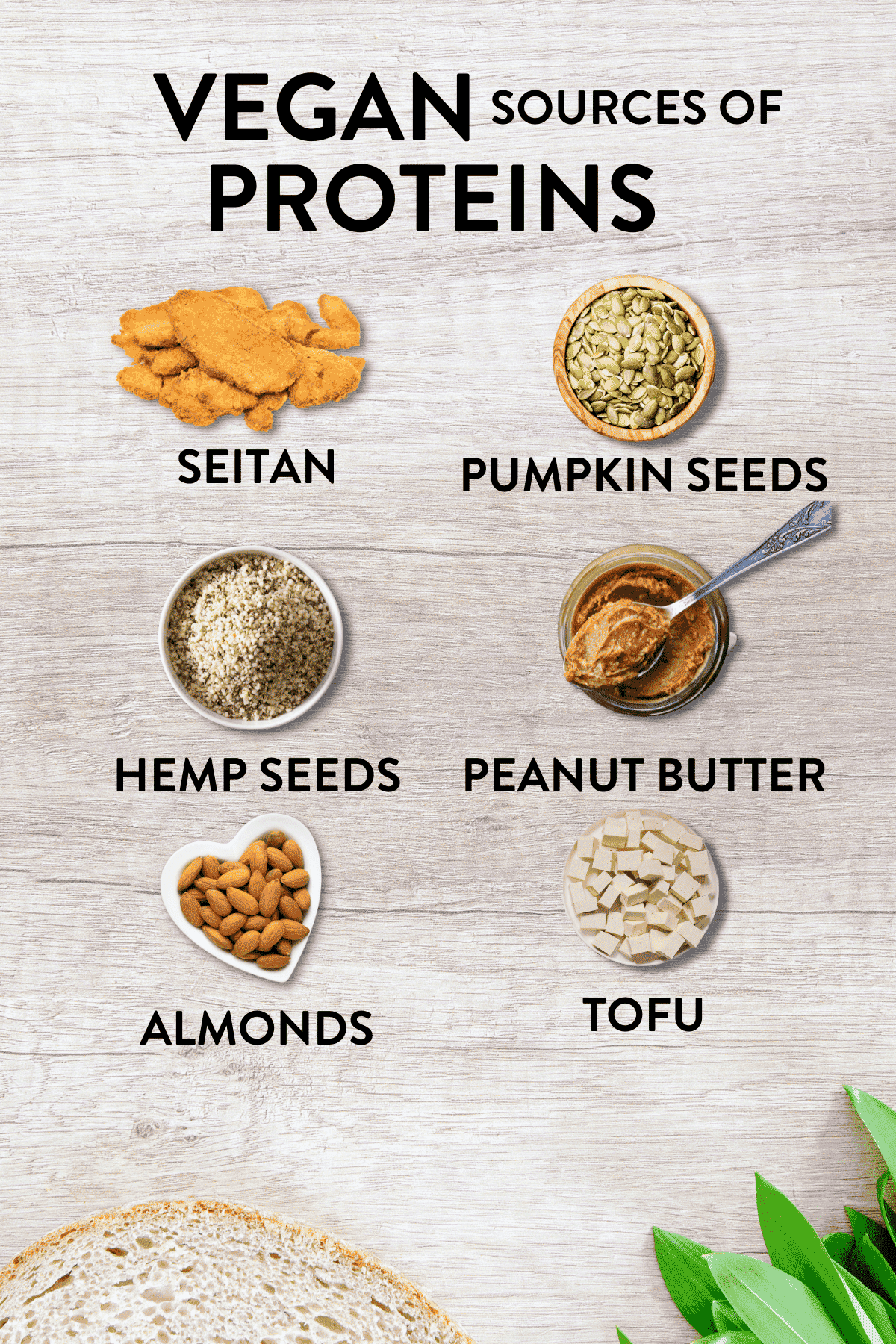
5. Veganism Is By And For Privileged People
This myth would probably warrant a very long article to go through all the nuances, but it’s often thrown as an argument against spreading the vegan message or just against the environmental benefits of just eating more plant-based.
There are a few aspects to unwrap here: the socioeconomic aspect (do you need to be rich to be vegan?), the ethnic/cultural aspect (is veganism a white westerner thing?).
Socioeconomy and Veganism
The argument here is that vegan foods cost more, and therefore people that are vegan with their wealth shouldn’t be trying to convince those with less money.
It’s so wrong. Let’s find out why.
First, it’s important to note that like-for-like replacements are often more expensive. A Beyond Meat patty is indeed more expensive than a beef pattie. A vegan candy is often more expensive than candy with beef gelatin.
But processed food is very far from necessary food, and also, the slightly higher price paid for these is more than balanced by the lower price of other items.
In fact, a study by Kantar for Veganuary shows that it’s about 40% cheaper to eat vegan.
According to this study on 30,000 households, vegan meals are faster to prepare (and time is money), on top of the cheaper grocery trips.
So no, eating vegan is not for the rich. In fact, in the US, there’s a higher proportion of vegans among the lowest annual income bracket than any other income bracket.
The Ethnicity of Vegans
The other argument is that veganism is mostly a white-westerner thing.
Looking at the reality of veganism in the world paints quite a different picture.
First, the cities with the highest ratio of vegans are Asian cities (Chiang Mai, Thailand, and Ubud, Bali are the top 2).
When it comes to whole countries, Mexico tops the chart with 9% of vegans, followed by Poland, Israel, the Scandinavian countries, Brazil, the US, and Japan – quite a melting pot.
If you consider vegetarians in the mix, India is far ahead with up to 39% of vegetarians.
When looking at the gender and racial aspect of veganism, it’s also flagrant that the stereotypes fall apart.
First, 74% of vegans in the USA are female.
Then, the ratio of vegans in the US Black population is higher (4%) than in the general US population (3%).
On top of that, while veganism as a label or movement was created in the 20th Century, many traditional diets have been plant-based for centuries.
Why is it a myth? Because the average vegan is not white nor rich.
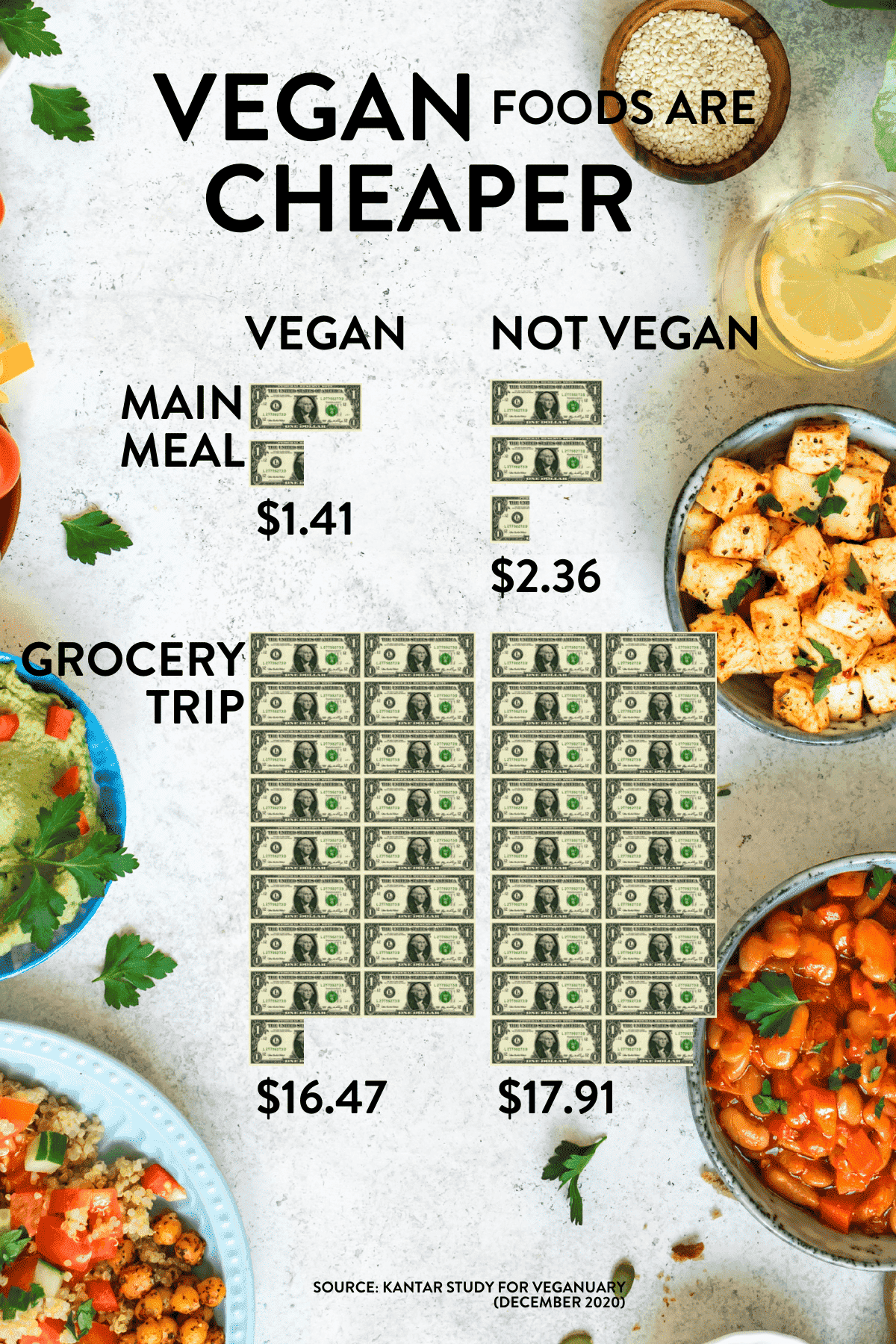
6. Vegans Can’t Do Any Physical Activity
Another frequent misconception is that the lack of protein (debunked above), iron, and vitamins makes vegans sluggish and lethargic.
While it is true that low iron levels and Vitamin B12 deficiency definitely lead to fatigue and anemia and that vegans are more at risk of such deficiency, the generalization is incorrect.
Vegans tend to be more aware of the potential deficiencies that come with their diet than non-vegans with theirs.
As a result, they tend to be better equipped at dealing with these potential risks.
There are more and more popular athletes following a plant-based diet (Tom Brady, the Williams Sisters, Novak Djokovic, Lewis Hamilton, Mike Tyson, Colin Kaepernick, Elijah Hall, etc.).
And it’s not always because they are buying into the veganism message. Plant-based diets are known to increase athletic performance, reduce inflammation, and provide cardioprotective properties (source).
Why is it a myth? Because there are many vegan athletes.

7. Vegan Foods Are Always Healthy
Many people are under the impression that veganism is all about being healthy and eating green and wholesome products.
While this is certainly true for many vegans, that’s not what veganism is intrinsically about.
In fact, it’s perfectly possible to be vegan and eat only highly-processed fast-food-style food!
Veganism is not synonymous with a healthy diet though it’s often correlated.
Why is it a myth? Because some vegan foods are just as unhealthy as non-vegan foods.
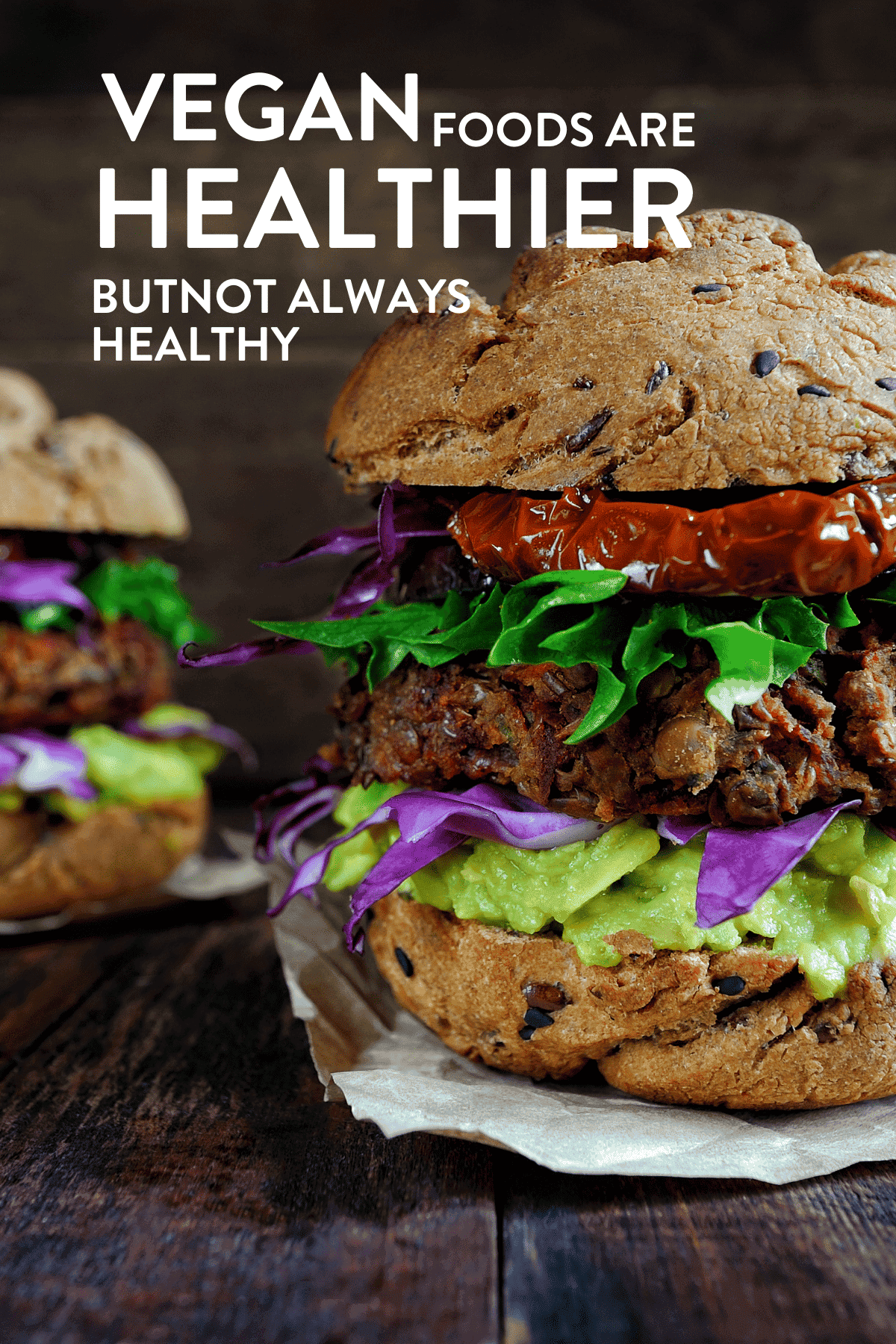
8. People Always Lose Weight On A Vegan Diet
Losing weight can be why some people follow a plant-based diet.
In fact, losing weight is the number one reason for people cutting down meat consumption, while it’s the third most frequent reason for going vegan.
Since veganism is not per se about eating healthy, there’s no automatic weight loss associated with going plant-based.
Why is it a myth? Because you can also gain weight on a vegan diet.
9. Without Dairy, Vegan Have Weak Bones
It’s quite true that vegans tend to have weaker bones than meat-eaters – it’s been widely documented that vegans are more at risk of hip, leg, and arm fractures (source).
But so is the case for vegetarians (who drink milk) and pescatarians (who also drink milk).
Research has shown that it’s not quite the calcium from the dairy products that is the deal (or bone) breaker.
They have found that, in general, lower BMI is associated with increased fracture risks, and there’s a correlation between low BMI and a vegan diet.
Protein intake, as well as calcium intake, is also associated with higher risk.
Many plant-based foods contain a high concentration of calcium (kale, broccoli, bok choi, beans, nuts, etc.), and there are now countless plant-based milk options enriched in calcium and other nutrients.
Why is it a myth? Because bones are strong when there’s a good balance of protein, vitamins, minerals, and a healthy BMI.
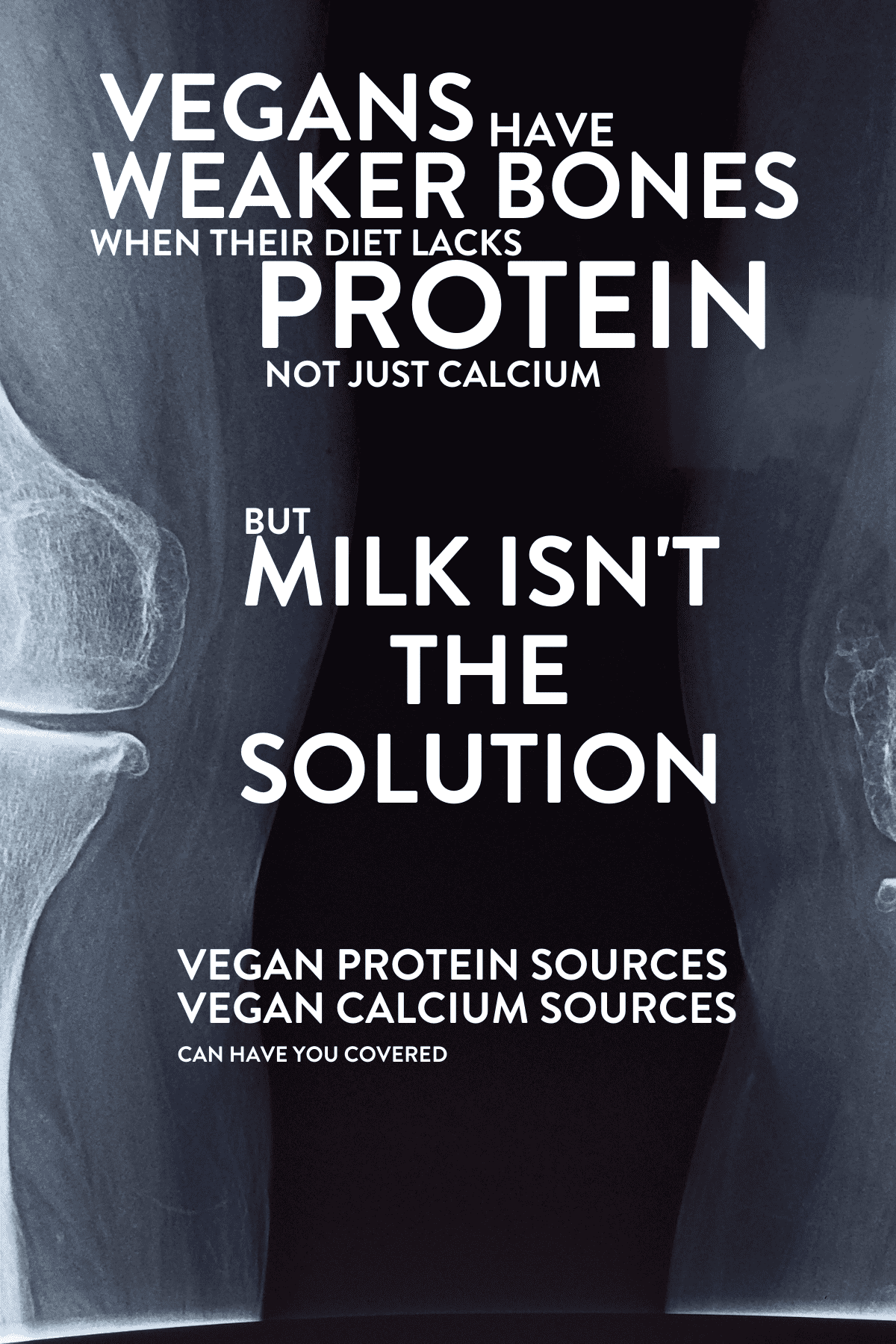
10. All Vegans Need B12 Supplements
Vitamin B12 is essential for a healthy body.
Many people believe that this vitamin is somehow created by the animals they eat. The reality is that it comes from bacteria in the ground that is then eaten by grazing cattle or flows to the sea and get absorbed by fish and seashells.
But with the industrialization of meat production, most of the B12 that meat-eaters consume actually comes from supplements given to barn-bound or caged animals.
Vitamin B12 is actually present on the skin of organic vegetables, but most industrially-produced crops are too sterile to still contain the vitamin.
For vegans, though, many foods are supplemented with B12, such as cereals, plant-based milk, nutritional yeast, etc.
So the bottom line is that whether you are vegan or meat-eater, you are just the same indirectly taking Vitamin B12 supplements!
Most of the time, these indirect supplements are enough to cover your daily intake of B12.
Why is it a myth? Because almost everyone’s B12 are supplements, directly or indirectly, vegan or not.
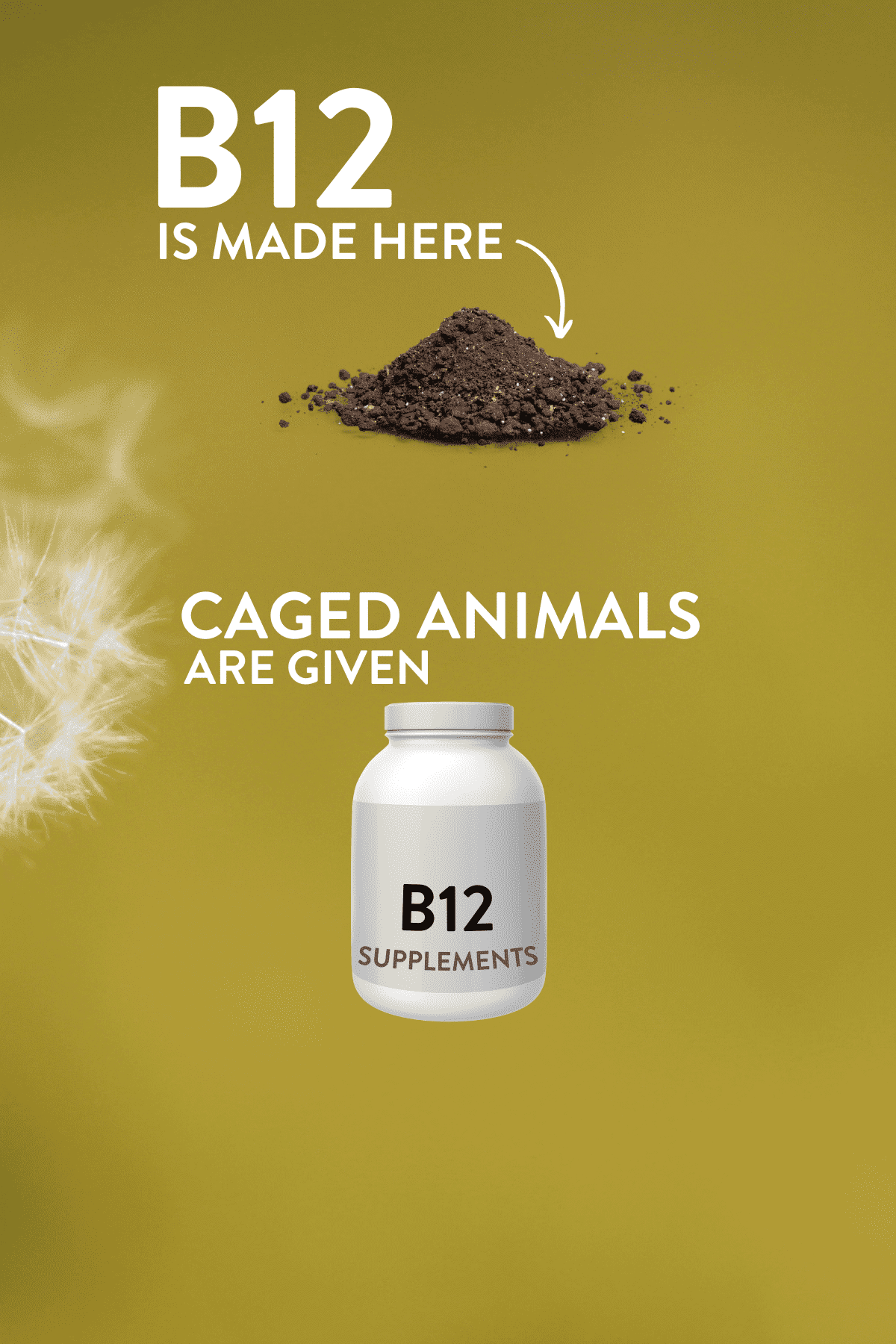
11. Drinking Soy Milk Gives You Female Hormones Or Breast Cancer
Soy Milk naturally contains phytoestrogens that are very similar to the female hormone estrogen.
Estrogen is a hormone essential to reproduction and is responsible for the development of the breast during childhood.
Its high concentration can lead to breast cancer.
However, phytoestrogen behaves quite differently, and the consumption of soy milk with this hormone-like substance hasn’t been linked to an increased risk of breast cancer.
In fact, studies have shown higher consumption of soy milk has been linked with a 30% reduction in breast cancer rate.
When it comes to the risk of men growing breasts due to the consumption of soy milk and the presence of phytoestrogen, there has been absolutely no scientific evidence.
Many Asian countries have traditionally consumed soy in various forms for centuries and have seen no man breasts epidemic.
Source: Impact of Soy Foods on the Development of Breast Cancer and the Prognosis of Breast Cancer Patients.
Why is it a myth? Because there’s no scientific evidence of either (quite the contrary, in fact).
12. Plants Have Feelings Too
You often hear from the most stubbornly anti-vegans that eating plants is just the same as eating animals because, just like animals, plants have feelings, and emotions.
The fact is that plants and animals are very different, and the term feelings can’t apply in the same way to both.
Feelings and emotions in animals are based on a central nervous system, a brain that processes information, and a body that reacts based on this information.
Not all animals have the same level of complexity in their nervous systems, and for the smaller ones, this reaction is chemical, not conscious.
Sentience is where vegans draw a line. Sentient animals can feel simple emotions like fear or pain and more complex ones like joy or love.
The level of animal consciousness depends on the species, some, such as most mammals or octopuses, experience much more consciousness than others.
And plants, despite some being able to communicate, are at the bottom of the consciousness and sentience scale.
So comparing their sentience to animals is just like asking why they should make an effort to pollute less when everyone pollutes.
Source: Plant “intelligence” changes nothing
Why is it a myth? Because while plants have a form of sentience, it’s nowhere near as developed as large animals.
13. All Products Made From Plants Are Vegan
Saying that all products made from plants are vegan is taking a shortcut that ignores some potential problems.
Problem 1: Made By Animals
Take the example of honey. It comes from plants, but it’s manufactured by animals.
If honey was a byproduct or a waste of animal production, it could be potentially vegan. Just as compost is vegan. Compost is technically made by animals and bacteria.
But what makes honey not vegan is that it’s necessary for the hive, and it’s taken away from it and replaced by a lesser product.
So products made from plants by animals are not necessarily vegan.
Problem 2: Veganism is not just about animals
Veganism is often reduced to strictly reducing animal suffering.
While it’s a big part of it, veganism is also looking at the global impact on ecosystems and the human population (we are animals, after all).
So a perfectly plant-based product harvested in inhuman or unethical conditions cannot be vegan.
An example of that is chocolate. While more and more brands are trying to move to ethical sources, there has been a history of terrible practices in cacao harvesting.
Similarly, you’d have a hard time arguing that a product destroying a local ecosystem should be considered vegan.
Some plantations of olive oil are literally destroying parts of the Mediterranean countries. Palm oil is responsible for a huge amount of deforestation and directly endangering Orang Utans and other species.
Why is it a myth? Because veganism is not just about eating plants.
14. Nobody Can Actually Be Vegan
Some people contest the concept of veganism because nothing is vegan.
It’s actually a complete misunderstanding of the definition of veganism.
They are right that almost nothing is strictly made with zero impact on animals or zero animal products.
Why?
Here are a few examples.
Steel
Steel manufacturing uses animal products in the lubricants used to coat steel bars.
So technically, nothing made of steel or with steel is really vegan, right?
Glycerin
Lubricants are almost universally made with glycerin or glycerol, a byproduct of soap manufacturing that uses animal fats.
So indirectly, anything using glycerol or glycerin is made from an animal product.
That includes lubricants, soap, toothpaste, chewing gums, and brake fluid. And most plastics.
Latex
Latex is a natural product made from a tree. But it’s almost always treated with casein, a milk protein.
So if latex isn’t vegan-friendly, condoms, tires, mattresses, balloons, latex gloves, and paint would be off-limit.
So Nothing Is Vegan?
If you were to exclude just the three examples above, you wouldn’t use a computer, a car, live in a house, or use any lightbulb or any electric cable. Instead, you would live in a wooden hut made without nails.
That’s why it’s important to understand the definition of veganism.
Veganism is not about excluding any animal-based products, but it’s about reducing the harm made to animal and their exploitation as much as practically possible.
That’s a line in the sand that YOU set for YOUR own circumstances.
Why is it a myth? Because veganism is about reducing the impact as much as possible.
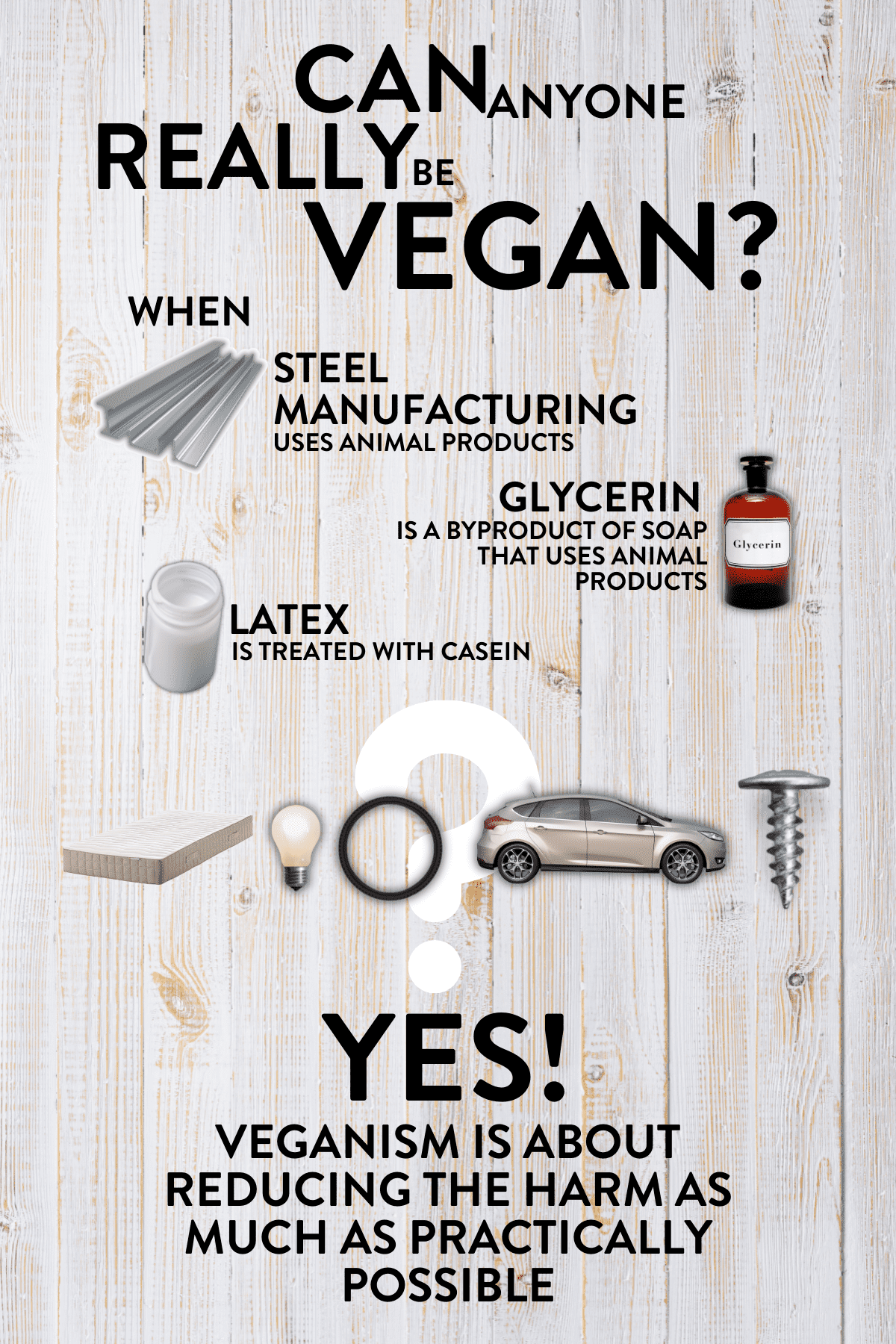
15. Veganism Is Expensive
Veganism can be expensive. But it can also be much cheaper.
If you are trying to replace an animal food like meat with a plant-based alternative, it will most likely cost you more.
While plant-based patties are good, are they necessary, though?
You can fill your meals with the perfect combination of carbs, proteins, and fats with more wholesome and cheaper ingredients.
In fact, you would find that the less processed they are, the cheaper they get.
You might think that it means spending more time in the kitchen, but it’s actually not what studies have shown.
The Kantar study we’ve already mentioned shows that it’s about 40% cheaper to eat vegan while taking between 32% and 37% less time to prepare!
Why is it a myth? Because plant-based food can be cheaper.
16. Plant-based Foods Are Boring
Vegans only eat lettuce and avocados, boring!
If you see the vegan diet as the subtraction of all meals containing animal food, there’s not much left than salads.
But once you realize that you can create all the tastes you want, it’s a different game.
Here are some examples of not-boring vegan recipes:
Why is it a myth? Because plant-based food can be delicious, refined, and tasty.
Conclusion
There are so many myths about the vegan lifestyle and plant-based diet.
Some of them are deeply entrenched in non-vegans, and some are still firmly believed by plant-based eaters.
But as always, it’s important to go back to the facts!







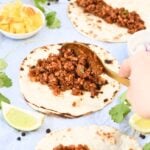
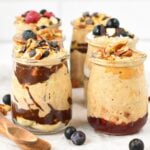



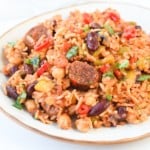


Leave a comment